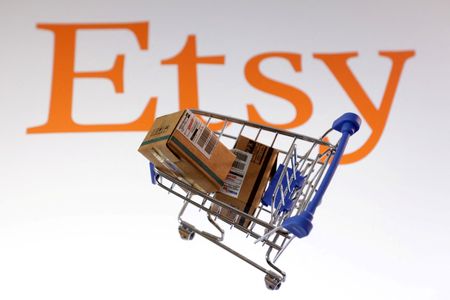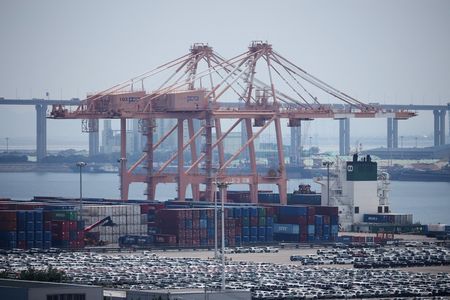LONDON/NEW YORK (Reuters) -Americans shopping for secondhand, vintage or handmade items on platforms like eBay and Etsy face steep customs duties on international purchases next month, potentially hurting trade on those peer-to-peer sites.
In a surprise move late on Wednesday, U.S. President Donald Trump ordered the removal of “de minimis” duty-free treatment on parcels under $800 from all countries, starting August 29 – bringing forward a change previously set for July 2027.
The acceleration follows pressure from groups that argue the exemption facilitates fentanyl smuggling and has led to a flood of cheap products entering the U.S. duty-free, undermining U.S. retailers and manufacturers.
Trump ended duty-free access for low-value parcels from China and Hong Kong at the start of May, disrupting ecommerce flows for online retailers like Shein and Temu.
According to Customs and Border Protection, 1.36 billion shipments entered the U.S. under de minimis last year, for a total value of $64.6 billion.
eBay and Etsy were among U.S. businesses that spoke out against the policy when CBP asked for feedback on the proposal to remove de minimis.
“These exemptions are a powerful tool that helps small creators, artisans, and makers participate in and navigate cross-border trade,” Etsy’s global head of public policy and advocacy Jeffrey Zubricki wrote in a submission to CBP in March.
“Many American Etsy sellers rely on de minimis to import and export products with key trading partners, sustaining their businesses and generating income to support their families.”
The majority of Etsy’s 5.6 million active sellers and nearly 90 million buyers are in the U.S. Etsy did not immediately respond to a request for comment on Thursday.
eBay also urged the customs agency to reconsider, arguing that de minimis gives American consumers access to “a global market to find value at lower prices, particularly for used goods and a unique, collectible inventory that is not available domestically”.
In a results call on Wednesday, eBay CEO Jamie Iannone flagged the elimination of de minimis outside of China as a potential disruption that may impact revenue. eBay did not immediately respond to a request for comment.
Goods shipped through the postal system will face one of two tariffs: either an “ad valorem duty” equal to the effective tariff rate of the package’s country of origin or, for six months, a specific tariff of $80 to $200 depending on the country of origin’s tariff rate.
It is the latest headache for small businesses grappling with hefty import tariffs imposed by Trump, driving up costs, forcing many to hike prices and fuelling concerns that Americans will be paying more for everyday goods.
“The complexity of doing business with the U.S. has gone to levels nobody could have imagined,” said Andrew Wilson, deputy secretary general of the International Chamber of Commerce.
He also questioned whether U.S. authorities can handle the tariff collections, potentially leading to delays and backlogs.
“Is border trade equipped to manage the checks and duties collection? If not, what happens with customs backlogs? It’s a huge additional burden from next month,” said Wilson.
(Reporting by Helen Reid and Josephine Mason in London, Arriana McLymore in New York;Editing by Elaine Hardcastle)











